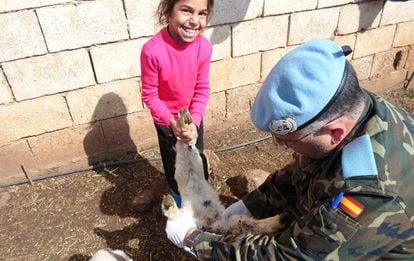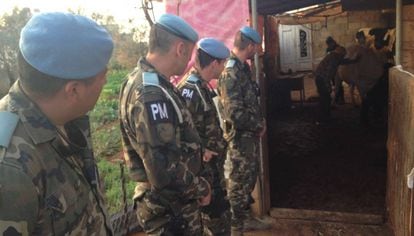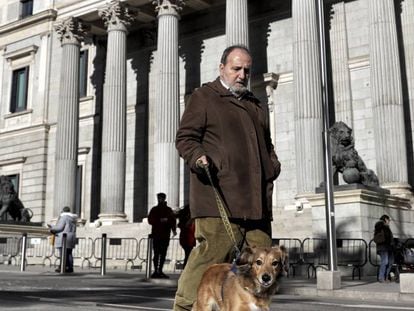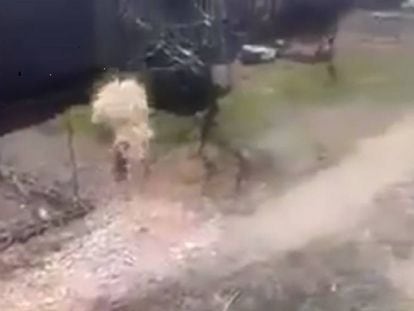The Spanish volunteer vets taking care of livestock in Lebanon
Every year, a group of specialists travel to the Middle Eastern country to conduct medical check-ups on farms. Often, this is the only care the animals receive


How did a dean from Complutense University in Madrid end up with his arm inside a cow’s rectum in Lebanon? There is actually a simple explanation. “It was a house in which the cows basically lived in the same space as the old couple. I put my hand in, and everyone stared at me with great curiosity. I confirmed that the cow was pregnant, and the best thing was the look of happiness on their faces. We hugged and everything, “ explains Pedro Lorenzo, the dean of the School of Veterinary Medicine at the Madrid university.
Lorenzo is part of a group of specialists from different Spanish campuses who travel each year to the Miguel de Cervantes military base located in Blat, Lebanon. For one week, the veterinarians are granted permission by mayors and religious leaders to visit various farms and take care of the animals. For the majority of the farmers, it is the only annual medical check-up available to their livestock, which serve as their main source of income and food.

Librado Carrasco, a former dean at the University of Córdoba in southern Spain, started this mission 10 years ago. “In 2009, the military stationed at the base came from my province, so they invited some faculty members to take a look at the facilities and the country, and they asked us if we could do something to strengthen ties. A month later I was on my way back to Lebanon with two colleagues and 60 kilos of medicine,” says Carrasco. “We went there with the idea of saving the world, but we realized that this notion was pathetic. Over there you have to start from scratch, there are situations and illnesses that we’ve forgotten about in Spain a long time ago.”
Two years after that impromptu expedition, the project began to pick up steam. Kilos of medicine began to arrive in Lebanon in military crates, and veterinarians were able to start staying at the base for prolonged periods of time while the soldiers got permission from mayors. “That year, the project expanded to other universities and brigades around Spain. And the Defense Ministry and the Association of Veterinarians signed an agreement.” Since then, the project has not stopped growing – specialists from Zaragoza, Murcia, Cáceres, Valencia, Barcelona and Seville have joined in in the past few years.

In the same day, the team can go from idly listening to music at the base to risking the loss of a leg. “On one occasion, the cars left us at a spot and we had to meander to get to the farm. We could think of nothing better than just cutting across a field to save time. The soldiers got out of the car looking very alarmed, saying we had to get out of there. It was an area filled with mines,” explains Lorenzo. The veterinarians are always escorted by soldiers who follow predetermined routes.
They were able to overcome farmers’ initial misgivings with a portable ultrasound they brought with them. “At the beginning they didn’t trust us, but when they saw that with [the ultrasound] we could see if the animals were pregnant or not, they started to trust us more.” Access to these kinds of devices is made possible by donations from pharmaceutical companies, while the expeditions to Lebanon are paid for by the universities and the vet association. In the last mission, which took place in mid-March, the vets brought €30,000 worth of medicine with them and brought along around 20 veterinary students from Beirut. “We bring with us above all antiparasite medication and disinfectants. We don’t use antibiotics as much, and vaccines not at all because we don't want to interfere with the national health programs,” explains Lorenzo.

The locals talk about the people who come take care of their animals as “the Spaniards.” “Once a translator told us that a cow had yellow fever. We were very confused. It is a human disease so we asked ourselves how it was possible for a cow to have contracted it. After some confusion we arrived at the conclusion that the farmers had detected that the animal had a fever and was turning yellow, and thus determined that it had yellow fever,” says Carrasco. “In Lebanon you see levels of scabies that you rarely [see in Spain], or an entire livestock full of ticks. Other times it's a funny situation because you are working in the same room where a donkey, a sheep and a bunch of turkeys are running around.”

Some veterinarians have had to overcome other kinds of challenges. “Some of the farmers don’t want a woman touching their animals. We try to deal with it as best we can. Sometimes we don’t insist, and other times we convince them that [the woman] is the one who will fix the problem, that she knows more than us and will help the animals get better,” says Carrasco, who since 2015 has been prolonging the duration of his stays in Lebanon.
On one occasion, a farmer asked Carrasco to take a picture with his son, which Carrasco agreed to on the condition that the boy’s sister also be included. “Now this girl wants to be a veterinarian. It’s the best gift.”
English version by Asia London Palomba.












































